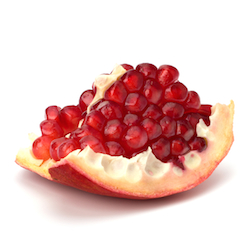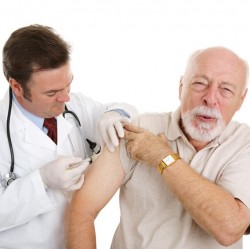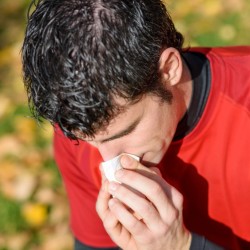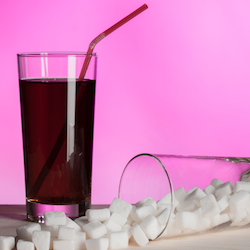Month: August 2014
Influenza Vaccine in Elderly: Nutritional Status-Dependent Immunogenicity
The immune response to influenza vaccine is attenuated in elderly persons, though they are at greatest risk for morbidity and mortality by influenza virus infection. Experimental studies demonstrate that co-administration of L-cystine and L-theanine enhanced antigen-specific production of immunoglobulin in aged mice infected with influenza virus. This study thus investigated the effect of L-cystine and L-theanine on antibody induction by influenza vaccines in elderly persons. By Koichi Miyagawa, Yoshimitsu Hayashi, Shigekazu Kurihara and Akiko Maeda, published in Geriatrics Gerentology Int’l., Japan Geriatrics Society, Vol. 8.
Perioperative Supplementation Enhances Surgical Recovery After Distal Gastrectomy
This study was a pilot study to assess the effect of perioperatively administering oral cystine and theanine in gastric surgery patients and suggested that oral administration of these amino acids may reduce inflammation and promote recovery after gastric surgery. This study postulated that cystine and theanine would reduce excessive inflammation and immune suppression during the perioperative periods of abdominal surgeries, which decreases GSH levels in blood and skeletal muscle. The researchers examined the effects of perioperatively administering cystine and theanine on the postoperative course of gastric cancer patients undergoing distal gastrectomies as a pilot study. By Tomohiro Miyachi MD, Takashi Tsuchiya, MD et al., published in J of Parenteral and Enteral Nutrition, 2012.
Cystine and Theanine: Suppression of Exercise Induced Neutrophilia and Lymphopenia
Intense exercise induces increased blood neutrophil counts and decreased lymphocyte counts, and leads to inflammation and immunosuppression. It was previously reported that cystine and theanine (CT) supplementation by long-distance runners before training camp suppressed changes of these blood parameters observed in unsupplemented control subjects after the camp. This study examined the effects of CT supplementation on the inflammatory response and the immune state before and after intense endurance exercise in long-distance runners at at training camp. By Shigeki Murakami et al, published in J or the Int’l. Society or Sports Nutrition, Vol. 7, No. 23
Double-blind, Randomized Trial on Cystine, Theanine and the Common Cold
The common cold, an acute infection properly known as “cold syndrome,” is the most common human illness. The majority of cases of cold syndrome are acute infections of the upper respiratory tract, and its major cause is viral infection. Conventional methods of treatment use medications, such as analgesic agents and antihistamines, but these are only effective for the alleviation of symptoms, such as sneezing and runny nose. The incidence of subjects with colds during this trial was significantly lower in the CT group than in the placebo group, although the duration of the colds was not significantly different between the groups. These results suggest that CT supplementation may be useful for the prevention of the common cold. By Shigekazu Kurihara, Takenori Hiraoka, Masahisa Akutsu, Eiji Sukegawa, Makoto Bannai, and Susumu Shibahara, published in J of Amino Acids, Vol, 2010.
Attenuation of Natural Killer T-Cells with Cystine and Theanine
Men who perform resistance training 3 times a week for at least 6 months tend to have lower T-helper cell counts than non–resistance trained men. In addition, the natural killer (NK) cell count, an index of innate immunity, has been shown to decrease below the resting value after submaximal resistance exercise in both resistance-trained and non–resistance-trained men. It is a common hypothesis that resistance training impairs the immune system rather than enhancing its functions. This study examined the affects of cystine and theanine on NK cells, inflammation and immunity. By Shigeo Kawada, Kando Kobyahi, Masaru Ohtani and Chiho Fukusaki, published in J of Strength and Conditioning Research, Vol. 24, No. 3
Integrative Psychiatry Effective but Overlooked for Cancer Patients
Nearly three-quarters of cancer patients who have major depression are not currently receiving treatment for depression, and that a new integrated treatment programme is strikingly more effective at reducing depression and improving quality of life than current care, according to three papers published in The Lancet Psychiatry, The Lancet, and The Lancet Oncology. Lead author Professor Michael Sharpe from the University of Oxford in the UK, says “The huge benefit that DCPC delivers for patients with cancer and depression shows what we can achieve for patients if we take as much care with the treatment of their depression as we do with the treatment of their cancer.” By M Sharpe, et al., published in the Lancet and Lancet Oncology, Aug. 2014.
Hispanic Men Most Affected by Diabetes Epidemic
Close to half (40%) of the adult population of the USA is expected to develop type 2 diabetes at some point during their lifetime, suggests a major study published in The Lancet Diabetes & Endocrinology. The future looks even worse for some ethnic minority groups, with one in two (> 50%) Hispanic men and women and non-Hispanic black women predicted to develop the disease. A team of US researchers combined data from nationally representative US population interviews and death certificates for about 600 000 adults to estimate trends in the lifetime risk of diabetes and years of life lost to diabetes in the USA between 1985 and 2011.
Breastfeeding & Intestinal Microbiota in Infants
Put the Script Pad Down: FDA’s New Drug Approvals Pose Significant Risks
For every 100 new drugs introduced in the market, there have been 34 withdrawals or new black box warnings in the past 25 years. Since 1992, FDA sped up the pace and approval process for pharmaceutical companies willing to pay a fee. Approval time was cut in half, but with it came a significant number of safety withdrawals and warnings. This study, released today in Health Affairs, shows the expeditious process has placed millions of Americans at risk, essentially making them unwitting members of safety trials after the drug was approved.











